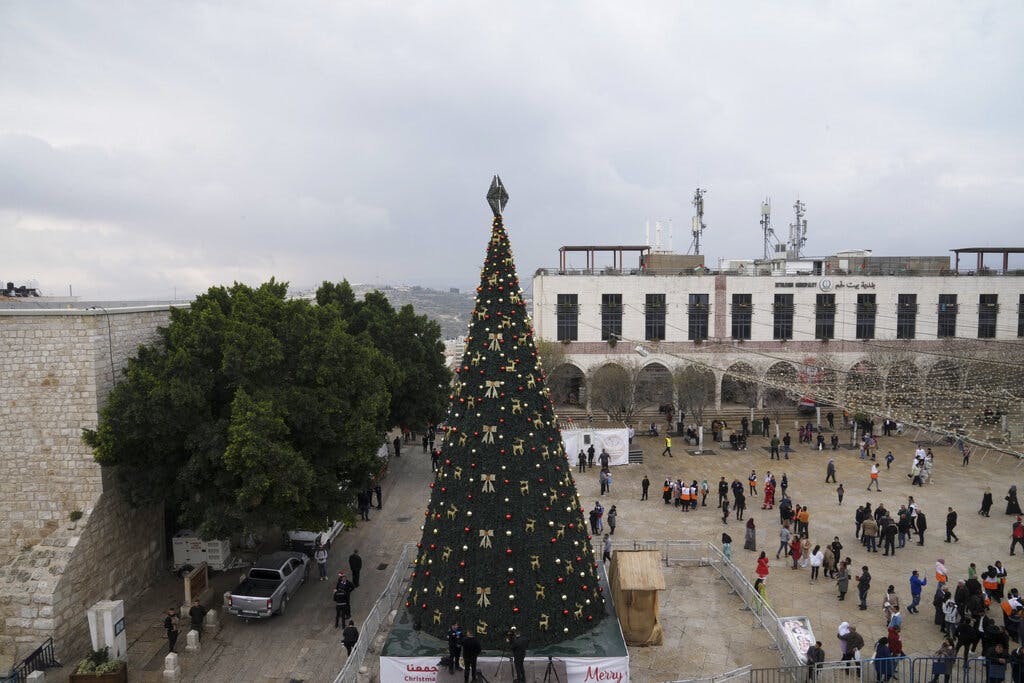On Christmas, a Sad Story Is Emerging in Bethlehem
Christians are fleeing the birthplace of Jesus.

Tourists are flocking to Manger Square’s Church of the Nativity, but in the little town of Bethlehem, a once-thriving Christian community is fast disappearing.
Nor, in this regard, is the West Bank city unique. Across an increasingly intolerant Mideast, where Islamists gain power, various Christian denominations, some dating back to the early days of Christianity, are shrinking.
Bethlehem is worth watching, as the Christmas story is being told across the world this weekend, when trees twinkle, lights brighten, and wrapped presents await opening. In the birthplace of Jesus, yuletide is when Bethlehem’s only source of income, tourism, reaches its peak.
This year tourists are slowly returning, following the shutdown of the pandemic years. Yet, as Russia wages war on Ukraine, Orthodox churchgoers who once might have traveled to where Christ was born are now absent. Numbers of visitors from elsewhere are also down from better times.
In the past, and for generations, local artisans flourished selling nativity-themed figurines carved of olive wood. No longer. Now they are looking for better sources of income, like construction work in Israel, while they seek ways to emigrate. Anywhere but Bethlehem.
The economy is far from the only reason Christians, at least those who can, get out of town. Badly-managed governments and political pressures both contribute to their woes. So do occasional, though well publicized, attacks by zealot Jewish settlers.
Yet, the wrath of Islamists is by far the top reason that Bethlehem Christians flee. The Mahmoud Abbas-led Palestinian Authority is not much help either. In 2017 the mayor of Bethlehem, Anton Salman, complained in a piece in Haaretz that Israel’s ministry of tourism is attempting to hijack the city’s holiday revenues. Late last month, though,he turned his ire on the Palestinian Authority instead.
Ramallah-based PA officials were forced to cancel a Bethlehem press conference announcing their Christmas plans. The cancellation followed complaints from the locals that their municipality, rather than the PA, has traditionally been responsible for organizing the festivities.
“Jesus was born in Bethlehem, not Ramallah,” a local Christian tour guide told the Jerusalem Post. “What the Palestinian leadership is doing is an insult not only to Bethlehem but to all Christians.”
The Palestinian Authority assumed jurisdiction over Bethlehem in 1995 as part of the Oslo agreements with Israel, which had controlled the city since the 1967 Six Day War. As late as the mid-1990s, when Israel was in control, up to 80 percent of Bethlehem’s population was Christians. Now only 12 percent are Christians.
While Islamists push Christians out, the Palestinian Authority rarely defends them. “On Friday you will hear the mouazin on the loudspeakers from the mosques speaking against Jews and Christians,” an unidentified local Christian leader told the London Times. “It’s hatred you hear in their prayers.”
According to a study cited by the Times, 75 percent of Christians in Bethlehem and the adjacent Beit Sahour — where, according to Luke, local shepherds were told in advance about the birth of Jesus — are worried about Hamas. Some 77 percent worry about the influence of Salafist extremist groups across the region
Such fears are echoed all over the Mideast, where attacks against Chirstian communities in Egypt, Iraq, and elsewhere have grown significantly. Since the onset of the last decade’s turmoil known as the “Arab spring,” Christians dwindled to five percent of the region’s population, down from 20 percent a century ago.
“It’s scary and heartbreaking to think that there will hardly be any Christians left in the region,” a Lebanese-born film director, Adla Massoud, told the Sun. Her documentary, “Wild Is the Spring,” follows the plight of Christians and other Mideast minorities.
“The process began at the turn of the century and it has intensified in recent years because of conflict and economic stagnation, which force many Christians to leave,” Ms. Massoud says. Interviewees in her well-researched film mostly speak about attacks from ISIS and other groups in Iraq, Syria, Lebanon, and elsewhere in the region.
The Mideast outlier is Israel, where the Arab Christian population is flourishing and growing, rather than shrinking. Meanwhile at the place where Jesus was born it is harder to live as a Christian than it is to worship Islam at Bethlehem, Pennsylvania.

